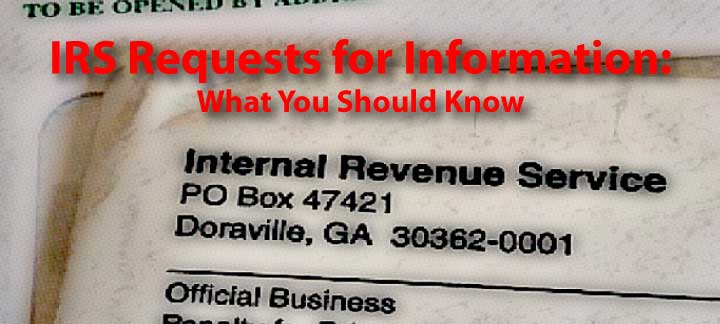IRS Revenue Agents and Auditors
Depending on the type of IRS audit being performed, either an IRS Auditor or an IRS Revenue Agent. The two types of IRS agents have different roles and duties.
IRS audits allow the US government to verify the information submitted on tax returns. Find news and information about how to protect your interests.

Depending on the type of IRS audit being performed, either an IRS Auditor or an IRS Revenue Agent. The two types of IRS agents have different roles and duties.

During an audit, the IRS will typically send written information requests to the taxpayer. They may issue a series of these written requests. The IRS also has the power to send written requests or summonses to third parties associated with the taxpayer, including banks, vendors, clients, and business associates.

Although the chances of being audited are relatively rare, certain items on a taxpayer’s tax return stand out as “red flags” to the IRS agents responsible for selecting returns to audit. If you have any of these items on your tax return, you are at an increased risk for a tax audit because these "red flags" are used as audit triggers.

There are several kinds of IRS audits. If your tax return has been selected for an audit, the IRS audit letter you receive should indicate the type of audit the IRS will perform.

There are several kinds of IRS audits. If your tax return has been selected for an audit, the IRS audit letter you receive should indicate the type of IRS audit process that you will be going through.

There are three different types of IRS audits, including correspondence audits, field audits, and office audits. The type of audit will depend on the information needed by the IRS. Correspondence audits are typically reserved for simple mistakes on the tax return, which can be easily corrected through mail correspondence with the IRS. Field audits and office audits are more intrusive to the taxpayer.

San Diego, CA May 15, 2014 - William D. Hartsock, the Chairman of the San Diego County Bar Association, Pro Se Program and tax attorney of over 30 years and owner of http://TheTaxLawyer.com, has published “The IRS Audit Roadmap - What you must know to avoid wrong turns when navigating an IRS audit” on Amazon this week. Long regarded by his peers and clients as the preeminent tax attorney in San Diego, Mr. Hartsock has created this work as an indispensable guide for anyone facing an audit and to address a growing need among high-income earners.

The IRS may decide to audit you for any number of reasons and the IRS audit itself can take a look at many different types of taxes, information and go back 3 or 6 years. However, did you know that once the audit is complete and the revenue agent reaches a conclusion, you do not necessarily have to accept that conclusion? In fact, many times you can reach a far better settlement than is offered upon completion of the audit. Read on to learn how.

The Fast Track Settlement process is a program recently made available to self-employed individuals and small businesses. This program allows qualified taxpayers to quickly settle their debt after an IRS audit through alternative dispute resolution methods. By electing to participate in Fast Track Settlement, a taxpayer loses none of his or her rights and may still elect to proceed to an appeal if the settlement measures are unsuccessful.

An IRS Revenue Officer is an IRS agent whose main purpose is to act as a tax collector for the IRS. Revenue officers perform tax collections duties and are skilled in searching a taxpayer’s assets to find collectable amounts to satisfy any outstanding tax debt. Revenue Officers do not necessarily need to have a financial background in order to be qualified for the job. They typically have a four-year degree.
Comments (0)